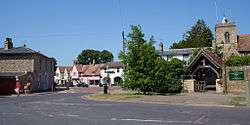Saint Vigor
| Saint Vigor | |
|---|---|
|
Fresco at the Church of St Vigor de Neau | |
| Born | Artois |
| Died | circa 537 AD |
| Venerated in |
Eastern Orthodox Church Roman Catholic Church |
| Feast | November 1 |
Saint Vigor (French: Saint Vigor, Vigeur; Latin: Vigor, Vigorus) (died circa 537 AD) was a French bishop and Christian missionary. Born in Artois, he studied at Arras under Saint Vedast. His father would not grant approval for him to become a priest, so he ran away from home. Thereafter, he became a hermit preacher at Ravière and worked as a missionary. Saint Vigor was named bishop of Bayeux in 514. [1]
He fervently opposed paganism and founded a monastery, later known as Saint-Vigor-le-Grand. In Bayeux, Normandy, he destroyed a pagan temple that was still in use and built a church on the grounds.
Veneration
In Normandy, Vigor was venerated and churches are dedicated to him. Normandy was the site for the establishment of his cult after the successful Norman conquest of England. Two English churches have been dedicated to Vigor; one in Fulbourn, Cambridgeshire, the other in Stratton-on-the-Fosse, Somerset.[2] His feast falls on All Saints Day (November 1), and as a result is often moved to another date.[3] Saint Vigor is mentioned in the life (vita) of Saint Paternus.[3]
 Statue of Saint Vigor
Statue of Saint Vigor- Église St Vigor Neau.
- Fresco at the Church of St Vigor de Neau.
- Église Saint-Vigor at Marly-le-Roi
 Church of St Vigor with All Saints at Fulbourn, England
Church of St Vigor with All Saints at Fulbourn, England
Notes
- ↑ Edit, Fulbourn and the Wilbrahams | powered by Church. "Fulbourn and the Wilbrahams - History of Fulbourn churches".
- ↑ "Detailed Record".
- 1 2 "saintpatrickdc.org".